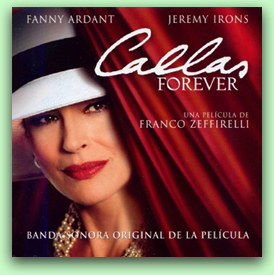
Directed by Franco Zaffirrelli
Review by Rada Djurica
Callas Forever was screened at the Pula Film Festival.
With all of Maria Callas’ successes and best performances long past, Callas (Fanny Ardant) withdraws to live her final days. Even after the death of her manager, her one true love, Larry Kelly (Jeremy Irons), in spite of her throat disease, the opera queen attempts a spectacular comeback. She gets tempted by an offer to lip-sync to recordings of her previous performances because of her poor physical state, which renders her unable to perform as before. Eventually, one opera she'd recorded but never performed is offered to Callas, one last shot to relive her former opera singing glory.
This is a sad film about a woman who has lost a precious and unique talent, as well as her self-confidence as an artist and a woman. Thanks to her gay manager (was he just a manager?), in a short period of time, she gets a chance to relive her moments of glory (again, as a woman and as an artist).
In the end, she realizes that it was all fake. The process of dishonesty to her fans is making her dishonest, too, a common person. Facing real life, just like everybody else, on her own, strong and without the gift that has distinguished her from everybody else, she learns a precious life lesson. We are all human, some with better fortunes in life.
Fanny Ardant, who plays Callas, has the ability to portray the most beautiful woman in the world (as Jeremy Irons says of her in the movie), a woman who shows that beauty doesn't pass with time, if it comes from inside.
For this mournful look at opera diva Maria Callas in her last days, director Franco Zeffirelli's biographical drama attempts to explore the irresistible glamour of a fallen star's comeback. Every fallen star hungers for the success of her past.
Franco Zeffirelli started his career as an actor in stage productions. After World War II, he launched a career in designing, costuming and directing operas. In his life, opera contributed to his good reputation, so it's no wonder that he's finally directed a film about Maria Callas.
In the '60s, Zeffirelli became known for his nontraditional versions of Shakespeare. In 1967, he became an icon for the youth movement, by casting very young actors, 16-17 years old. In the 90s, Zeffirelli returned to Shakespeare.
So, given this film director’s profile, I am not surprised by his choice of cast: Jeremy Irons next to a classic beauty Fanny Ardant. "Leading man" is not always synonymous with "star." Jeremy Irons is not the kind of actor who would be delighted to be called a star. Every film has one or more "stars," but the list of true leading roles in Hollywood is remarkably small.
One of Hollywood's discoveries is Jeremy Irons. Let's just remember Gary Cooper, Jimmy Stewart, etc. Maybe Irons can be compared with James Mason in his time? There is a certain quality of Jeremy Irons in the way that he chooses roles.
For Irons, the first great performance that he saw with that quality was "Lawrence of Arabia" (1962) with Peter O'Toole. "I thought he had extraordinary charisma and created magic on film that made me want to be part of that world. My favorite leading man would have to be Jack Nicholson, who combines a wonderful wickedness with a huge charm and a great wit."
Jeremy Irons is the kind of actor who doesn’t have to play admirable roles. His characters don’t have to amuse and interest or capture the imagination, because this is where Irons is perfect. As Larry in Callas Forever he is so natural that he confirms his status as a top actor, within a rather boring film.